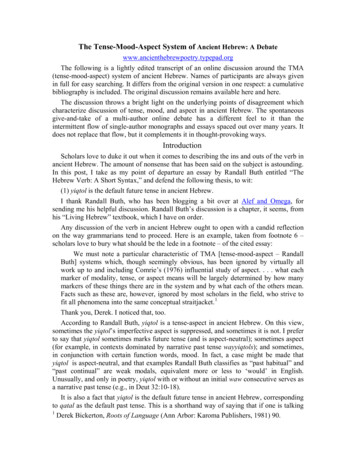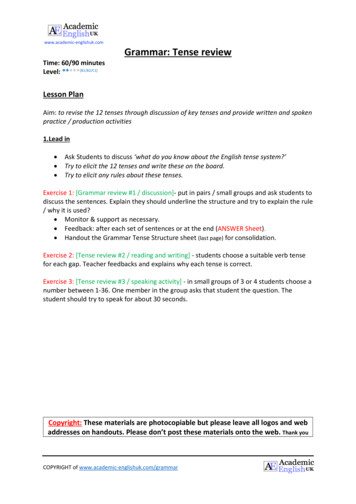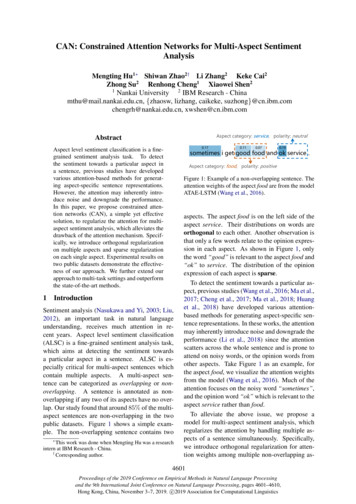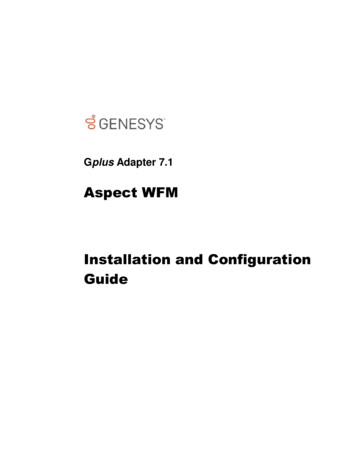
Transcription
The Tense-Mood-Aspect System of Ancient Hebrew: A Debatewww.ancienthebrewpoetry.typepad.orgThe following is a lightly edited transcript of an online discussion around the TMA(tense-mood-aspect) system of ancient Hebrew. Names of participants are always givenin full for easy searching. It differs from the original version in one respect: a cumulativebibliography is included. The original discussion remains available here and here.The discussion throws a bright light on the underlying points of disagreement whichcharacterize discussion of tense, mood, and aspect in ancient Hebrew. The spontaneousgive-and-take of a multi-author online debate has a different feel to it than theintermittent flow of single-author monographs and essays spaced out over many years. Itdoes not replace that flow, but it complements it in thought-provoking ways.IntroductionScholars love to duke it out when it comes to describing the ins and outs of the verb inancient Hebrew. The amount of nonsense that has been said on the subject is astounding.In this post, I take as my point of departure an essay by Randall Buth entitled “TheHebrew Verb: A Short Syntax,” and defend the following thesis, to wit:(1) yiqtol is the default future tense in ancient Hebrew.I thank Randall Buth, who has been blogging a bit over at Alef and Omega, forsending me his helpful discussion. Randall Buth’s discussion is a chapter, it seems, fromhis “Living Hebrew” textbook, which I have on order.Any discussion of the verb in ancient Hebrew ought to open with a candid reflectionon the way grammarians tend to proceed. Here is an example, taken from footnote 6 –scholars love to bury what should be the lede in a footnote – of the cited essay:We must note a particular characteristic of TMA [tense-mood-aspect – RandallButh] systems which, though seemingly obvious, has been ignored by virtually allwork up to and including Comrie’s (1976) influential study of aspect. . . . what eachmarker of modality, tense, or aspect means will be largely determined by how manymarkers of these things there are in the system and by what each of the others mean.Facts such as these are, however, ignored by most scholars in the field, who strive tofit all phenomena into the same conceptual straitjacket.1Thank you, Derek. I noticed that, too.According to Randall Buth, yiqtol is a tense-aspect in ancient Hebrew. On this view,sometimes the yiqtol’s imperfective aspect is suppressed, and sometimes it is not. I preferto say that yiqtol sometimes marks future tense (and is aspect-neutral); sometimes aspect(for example, in contexts dominated by narrative past tense wayyiqtols); and sometimes,in conjunction with certain function words, mood. In fact, a case might be made thatyiqtol is aspect-neutral, and that examples Randall Buth classifies as “past habitual” and“past continual” are weak modals, equivalent more or less to ‘would’ in English.Unusually, and only in poetry, yiqtol with or without an initial waw consecutive serves asa narrative past tense (e.g., in Deut 32:10-18).It is also a fact that yiqtol is the default future tense in ancient Hebrew, correspondingto qatal as the default past tense. This is a shorthand way of saying that if one is talking1Derek Bickerton, Roots of Language (Ann Arbor: Karoma Publishers, 1981) 90.
2to someone else in ancient Hebrew, it is correct to reach for a yiqtol form when beginningto speak about something one expects to happen in the future, and conversely, it is correctto reach for a qatal form when beginning to speak about something that belongs to thepast. For example: ָאנ ִֹכי ֶא ֱע ֶשׂה ִכ ְד ָב ֶרָך (1) I will do as you have spoken.Gen 47:30 יאיו ָ רוּח ֶשׁ ֶקר ְבּ ִפי ָכּל־נְ ִב ַ ֵא ֵצא וְ ָהיִ ִיתי (2) I will go out and be a lying spirit in the mouth of all his prophets.1 Kgs 22:22 ַעד יִ גָּ ֵמל ַהנַּ ַער וַ ֲה ִבא ִֹתיו (3) When the boy is weaned, I will bring him.1 Sam 1:22Qatal examples: ָא ִבינוּ ֵמת ַבּ ִמּ ְד ָבּר (4) Our father died in the wildernessNum 27:3 ל־ה ִמּזְ ֵבּ ַח ַ ת־אד ֹנָ י נִ ָצּב ַע ֲ ָר ִא ִיתי ֶא (5) I saw my Lord standing by the altarAmos 9:1 ימינוֹ ִ נִ ְשׁ ַבּע יְ הוָ ה ִבּ (6) The Lord swore with his right handIsa 62:8(3) is interesting, because the TMA system of English does not use its default futuretense in that kind of situation.Randall Buth makes the argument that yiqtol is the default future tense when he notes“which [verb forms] are attested with a word like מחר tomorrow (52 occurrences in theBible).” As he points out, yiqtol, consecutive weqatal, participles, and imperatives areattested with this verb, but not qatal. ‘ מחר עשה יי הדבר הזה Tomorrow יי will do thisthing’ is not ancient Hebrew; that would be ( מחר יעשה יי הדבר הזה Exod 9:5).Furthermore, ‘And when my glory passes by, I will put you in a cleft of the rock,’ whicha language that systematically marks aspect might realize with an imperfective –perfective sequence, is realized quite otherwise than with a yiqtol – qatal sequence inbiblical Hebrew: וְ ָהיָ ה ַבּ ֲעבֹר ְכּב ִֹדי וְ ַשׂ ְמ ִתּיָך ְבּנִ ְק ַרת ַהצּוּר Exod 33:22Perfective futures in ancient Hebrew are not expressed by qatal. They are expressedby yiqtol or consecutive weqatal (as in the preceding example). Therefore, the yiqtolqatal contrast is not aspectual in nature. I dare anyone to prove otherwise.
3Here are some Russian examples of perfective and imperfective futures. Don’t worry,you don’t need to know Russian to get the distinction:Буду читать (imperfective future) статью, надеюсь, что прочитаю (perfective future)I shall read/be reading the article and hope I shall get it finished.Қогда я буду проходить (imperfective future) мимо аптеки, куплю (perfective future)табпетки от кашляWhen I pass the druggist’s I shall buy some cough drops. 2Enough of the bluster that yiqtol and qatal are tense-neutral, and/or primarilyaspectual. Rather, yiqtol and qatal have a number of specific, context-sensitive usages. Inconjunction with other discourse cues, they mark tense, mood, and omnipotentiality orlack thereof (qatal, like the so-called gnomic aorist in Greek, is used to markomnipotentiality). If anything, yiqtol and qatal appear to be aspect-neutral. The termsimperfect and perfect are inappropriate.Posted by: John Hobbins February 05, 2008 PermalinkCommentsI think this is also a simpler way to teach ancient Hebrew verbs. Perfective /Imperfective language is confusing for newbies and leads to bad habits. Might there be adesignation for the prefix conjugation that describes what it does, as “imperfect” tried todo, and does not connote tense only, as in “future,” and avoids the morbidity of qatal?Teaching students how to say and write all the forms of “kill” might not be the best firsttime experience. I know it’s a strong verb, but it’s not the only one.Posted by: Daniel Rodriguez February 06, 2008 at 01:41 AMHi Daniel Rodriguez,I don’t like the verb qatal either. I learned on katav for the qal, and I still prefer it forthat binyan. I like the idea of picking different verbs to learn on for different binyanim,but that’s just me.Randall Buth suggests ‘future’ for yiqtol and ‘past’ for qatal in terms of labels inEnglish. But I’m not so sure we need labels.Posted by: John Hobbins February 06, 2008 at 02:04 AMActually, I prefer using he- atid and he- avar and sometimes “yiqtol” and “qatal” inlive classes.Basic principle: do in Hebrew and reinforce in Hebrew whenever possible, which isalmost always.On the above, without checking context, your example 3 might have used he avar inthe subordinate clause. See examples 31-32 in the cited article. 3Randall Buth2Terence Wade, A Comprehensive Russian Grammar (2d ed.; Malden: Blackwell, 2001)306-307.3Randall Buth, full reference.
4websitePosted by: Randall Buth February 06, 2008 at 05:47 AMI agree. In my dissertation on tense, aspect, and modality in the Dead Sea Scrolls, Idemonstrate that the qatal-yiqtol opposition is one not of aspect, but of tense or modality(if future and habitual actions are modal). A waw-prefix is “conversive.” It’s available at[hyperlink].I teach Biblical Hebrew yiqtol as modal, and qatal as past (except for semanticallystative verbs).You dared someone to prove the yiqtol-qatal contrast is aspectual in nature. I wouldlike to hear your review of two works, one by John Cook (here), and one by Rolf Furuli(here).Ken PennerPosted by: Ken Penner February 06, 2008 at 06:33 AMJohn Hobbins,I could not disagree more. I think John Cook’s aspectual model is the best explanationgiven so far (note the reference that Ken Penner gave). He not only explains the BH databut he, in my opinion, is the only one who has adequately dealt with the various linguisticmodels and cross-linguistic patterns.I teach the model we promote in our textbook 4 and my students rarely have a problemwith it. And students that have already studied a language other than English *never*have a problem with it.You ask for proof -- you’ll not get it (and you haven’t given any “proof” for yourmodel, either). But, if you do want to a model that is scientific, 5 you’ll need more than adeep knowledge of the biblical texts and a comparison one one other language, you’llneed just as deep a knowledge of TAM systems -- and how they develop diachronically -in Semitic and in non-Semitic languages. And again, you’ll spend an American PhDworth of time trying to better John Cook’s theory -- and I doubt it’s possible to producean alternate theory that explains the data from all angles as elegantly as John Cook’s.Robert HolmstedtPosted by: Robert Holmstedt February 06, 2008 at 08:56 AMJohn Hobbins,Notwithstanding Robert Holmstedt’s valiant defense, I will add the followingcomments regarding your challenge to “prove” otherwise:1) Your 6 examples are all direct speech. While the verb forms appear to contrast witheach other in terms of tense in direct speech (i.e., qatal past, qotel present, yiqtol future), this model does not work for non-speech.4Robert Holmstedt and John Cook, hereIf you bristle at my use of "scientific," then I recommend this good article: Pedro Beade,"Falsification and Falsifiability in Historical Linguistics," Philosophy of the SocialSciences 19 (1989) 173-81.5
52) Randall Buth’s examples with מחר do not prove that qatal is not past tense; theyonly prove that it is not non-past tense. Both conclusions assume tense a priori: eitherqatal is past tense or it is non-past tense.3) Most of your discussion is based on simple intuition, and all by people (you,Randall Buth, Ken Penner) whose native language is tense-based. No wonder thelanguage appears to “work” as tense—that is the character of the metalanguage.4) As a result, I find statistical studies such as Ken Penner’s and Furuli’s (despite thegreat differences between their conclusions and the generally much more sound linguisticfoundation to Ken Penner’s) provide me with no more than a statistical tallying of theirparticular intuitive interpretation of the verb in its various contexts. Statistics give a falsesense of objective proof in semantic study.5) So why the differences of opinion on tense versus aspect with regard to qatal? Ibelieve it is due to the semantically close relationship between past tense and perfectiveaspect as noted by Dahl 1985: 79 (available in pdf online: http://tiny.cc/xGqhL). Dahlstates that cross-linguistically ‘past time reference’ characterizes the typical use ofperfective verbs.(The case is similar to the English “will”: Is it future or modal? Linguists disagree, butI side with James D. McCawley that since certain statements about the future are judgedby people to be “true” or “false,” there must be a non-modal future to be referred to bytensed “will.” Another way to argue the case is that future-time reference alwaysaccompanies the use of “will” whereas a modal sense is not always apparent. Similarly,perfective aspect always accompanies the use of qatal, whereas past temporal reference istypical but not exclusive of the form, on which see below.)6) So how then can a case be made for perfective aspect at all? It would appear fromDahl’s observation that all perfective forms could easily enough be treated as past tenseand then we would eliminate another one of those pesky TAM categories. My response isthat there are two types of evidence germane to BH, and which are derived from crosslinguistic analysis and not intuitive interpretation:a) The first is that the qatal form is regularly used for present-time referenceָ ְלזַ ְר ֲעָך נָ ַת ִתּי ֶא . This isperformative statements, such as Gen 15:18: ת־ה ָא ֶרץ ַהזֹּאת directly contradictory to the notion that the qatal is past tense, whereas it makes sensewith a theory that recognizes that qatal is perfective aspect that typically has past-timereference but in cases such as this can have a present-time reference.b) Cross-linguistically past tense verbs and perfective verbs interact differently withstative predicates, thus providing an objective basis for distinguishing the two. Thepattern is a privative marked one: past tense verbs with stative predicates always expressstates or inchoative events with past time reference, whereas perfective verbs with stativepredicates express either past or present time reference, depending on the context. That iswhy we find in the Bible examples of ידע in qatal expressing present states “I know”(e.g., Gen 12:11: ת־מ ְר ֶאה ָא ְתּ ַ ) ִהנֵּ ה־נָ א יָ ַד ְע ִתּי ִכּי ִא ָשּׁה יְ ַפ . By contrast, wayyiqtol alwayshas a past temporal reference (e.g., Gen 3:7: )וַ יֵּ ְדעוּ ִכּי ֵע ֻיר ִמּם ֵהם .So, just to reply to your “dare,” good-naturedly of course, I “dare” you to explainaway this important typological data with your intuitively-based tense interpretation.
6For discussion of this typological data, see:Bybee, Joan. 1998. “Irrealis” as a Grammatical Category. Anthropological Linguistics40: 257–71.Bybee, Joan L., and Östen Dahl. 1989. The Creation of Tense and Aspect Systems inthe Languages of the World. Studies in Language 13: 51–103.Bybee, Joan L., Revere Perkins, and William Pagliuca. 1994. The Evolution ofGrammar: Tense, Aspect, and Modality in the Languages of the World. Chicago:University of Chicago Press.Dahl, Östen. 1985. Tense and Aspect Systems. Oxford: Blackwell.On yiqtol in particular, see my exchange with Jan Joosten in JANES:Cook, John A. 2006. The Finite Verbal Forms in Biblical Hebrew Do Express Aspect.Journal of the Ancient Near Eastern Society 30: 21–35.Joosten, Jan. 2002. Do the Finite Verbal Forms in Biblical Hebrew Express Aspect?Journal of the Ancient Near Eastern Society 29: 49–70.Posted by: John Cook February 06, 2008 at 09:45 AMNow that you’ve weighed in, John Cook, I should just head for the locker room andcall it a day. Whenever you talk about these things, I feel like I’m watching Eli Manningthrow the football.But I’ll come back to the topic after I lick my wounds. The game is too much fun,especially among friends.Thanks to Randall Buth, Daniel Rodriguez, Ken Penner, Robert Holmstedt, and JohnCook for joining the discussion. I will take up some of John Cook’s points in future posts.Posted by: John Hobbins February 06, 2008 at 10:05 AMI’ll deal with some of this later on another blog. Let me just clarify an obfuscation byJohn Cook:Randall Buth’s examples with מחר do not prove that qatal is not past tense; theyonly prove that it is not non-past tense. Both conclusions assume tense a priori: eitherqatal is past tense or it is non-past tense.This quoted sentence is a nonsense built around a ‘sense’ unit that is trying to behidden (the definition of ‘obfuscation’).Let’s start at the point of agreement:they [Randall Buth’s examples - Randall Buth] only prove that it [qatal - RandallButh] is not “non-past.”Folksies, that admits that there is a time-component in there somewhere, that there is atime-feature in the verb. There is a positive interactive with ‘non-pastness.’ It is exactlythe smoking gun that ‘aspect-only’ theorists pretend doesn’t exist. ‘Aspect-only’ wouldsay that the context marks the time, like the word ‘tomorrow’ in the examples, and theverb would mark the aspects. But 52 to zero the Hebrew verb refuses to use a particular“aspect” with that TIME word. A-priori-ness has nothing to do with this conclusion. It is
7simply a false/bad prediction of “aspect-only” theory. That is why the Hebrew verbMUST be defined as a Tense-Aspect-Mood, not a pure aspect, not a pure mood, and not apure tense. To wrangle about which of the three was first, is a wrangling aboutetymology, not meaning, to wrangle about which of the three is ‘more prominent’ is asubtle repetition of the same etymological philosophizing and is irrelevant to a languageuser and to the synchronic system. Once the whole TAM is in the simple verb system, thewhole TAM is in the system.People just don’t seem to understand the impact of closed systems in the languageworld, illustrated in Bickerton’s research into Creole and TAM. Creole’s tend to start tomorphogrammatize ‘perfective’ (so don’t be surprised to see ‘aspect’ at the base of IndoEuropean or Greek, or child development), but if the morpho-structure stops there, theverb system will use those “aspects” for time as well as mood. The meaning of a systemis determined to a large extent by have many pieces the cake is divided, and the cakeincludes aspect, mood and TIME. Cross-linguistic tendencies are nice, but not water-tightand sometimes done by people who are ignoring “Bickerton’s cake.” Rajesh Bhat warnedpeople not to use his classification system as a water-tight predictor of semantics.Another example, if sequential tense systems typically have only one person-inflectedverb structure, and we find two in biblical Hebrew, would that negate what Hebrew is?I will expand on my blog next week.Posted by: Randall Buth February 07, 2008 at 03:35 PMHi John Hobbins,Thanks for calling this discussion to my attention. I’m sympathetic to your proposal. Iteach my students that the basic meaning of yiqtol is to express the future. But to mymind that is simplification. In a discussion among grammarians I would rather define thebasic meaning of yiqtol as the expression of irrealis: yiqtol means the process expressedby the verb is not (yet) begun at the moment of speaking (or at reference time); it iscontemplated.In reaction to some of John Cook’s points (hi John Cook) I would say, firstly, that, yesfuture yiqtol forms occur in direct speech: where else would you expect them? Sincenarrative is situated at a point in the past, it does not allow the use of the simple future.Where the “future in the past” is to be expressed, in narrative, yiqtol is used (2 Kgs 13:14Now Elisha had fallen sick of his sickness whereof he was to die [ )]ימות .Secondly, I’m not an English speaker, but I don’t think it’s true “will” statementalways refer to the future. John Cook will say that, of course; but English “will” like BHyiqtol is also used in the expression of general truths and habitual processes.I agree that qatal is not a past tense (although, again, I do teach my students that qatalexpresses roughly the past). In my view, qatal is a perfect: it depicts the process asanterior to the moment of speaking (or to the reference time where this does not coincidewith the moment of speaking). But a grammatical perfect is not the same as a perfective.Performatives, in my understanding, should not be used to argue grammatical meaningbecause the function is wholly dependent on the pragmatic context. נתתי can mean “Ihave given,” and does so very often; only the speech situation (the felicity conditions)may lend it a meaning that we render in English with a present tense.
8Finally, and just for fun: wayyiqtol does not always have past temporal reference. Ps45:8 אהבת צדק וַ תשנא רשע , “Thou lovest righteousness, and hatest wickedness”. Thisusage occurs with the verbs בטח , גיל , ירא , ידע , נבהל and לאה .Jan JoostenPosted by: Jan Joosten February 08, 2008 at 02:40 AMShalom Jan Joosten,I, too, am sympathetic to your “future,” a.k.a., “irrealis.”I think that I see you doing what Joüon did almost a century ago, using terms that areincongruent, in order to implicitly expose the complexity/simplicity of the system. Joüonjuxtaposed perfect/future (an aspectual term and a time term) while you are juxtaposingperfect / irrealis (an aspect and a mood).In a chapter that helped trigger this discussion in [reference], I used a term‘indefinite,’ meaningless by itself and too לועזית for a classroom, in order to include bothtime and aspect, and implicitly mood, in the label of the Hebrew yiqtol. I think that it ishelpful for all concerned to follow Bickerton’s advice not to try to ‘straightjacket’something into one dimension of a multi-dimensional usage and reality. The problem orpower of the biblical Hebrew TMA is that it “under-differentiates,” but still covers all thebases, including TIME. In one sense it is using a binary switch in a three parameterworld.Actually, Biblical Hebrew uses an emerging three-position switch, since I agree withyou that the participle, contrary to Arabic, had already become a real present tense inFirst Temple Hebrew. (Though a couple of modal lexemes יכול , חפץ , lagged behind andonly expanded into the three-layered TMA at the end of the First Temple e.g. 1 Kgs 21:6 אם חפץ אתה . also LBH. (And בינוני יכל only in Biblical Aramaic).For the record, we use אני חפץ , אינני חפץ in our [reference] along with a binary אני לא אוכל , אוכל . We have debated going ‘First Temple only’ which would result insomething like a present situation: “ חפצתי אך לא אוכל I want to but I can’t.” (Maybewe’ll adopt it this summer, I’ll talk with teachers again. We let in words like כבר .) Butthe point isn’t time-machine purity, but rapid language acquisition for biblical Hebrew,especially for those not starting from modern Hebrew.Posted by: Randall Buth February 08, 2008 at 05:02 AM
9Shalom Randall Buth,The participle of יכל may be attested in Arad (Aharoni) 40:14: איננו יכלם לשלח we can’t sendThis would be First Temple (colloquial?). But the reading is admittedly doubtful.Posted by: Jan Joosten February 08, 2008 at 08:43 AMThank you for that, Jan Joosten.I knew I was forgetting something out there. The reading is actually solid for יכלם , itis only the ]אי[ננו that is partial. It just reinforces how the participle had taken over forthe present tense, because חפצים HAFETSIM and יכלים YEXOLIM were among the lastholdouts.Posted by: Randall Buth February 08, 2008 at 09:22 AMRandall Buth and Jan Joosten,I can’t resist responding to your previous post.1) Randall Buth, your argument is a non sequitur. Although I claim that qatal-yiqtolform an aspectual opposition, it does not follow that I deny the BH verb the ability toexpress TIME. Indeed, I am in full agreement with your reasonable claim that the BHverbal system is Tense-Aspect-Mood; to wit, wayyiqtol is past (narrative) tense, qatalyiqtol opposition is aspectual (perfective-imperfective), and VS ordered qatal and yiqtol,as well as the imperative, are irreal mood. You’ve chosen to ignore a most importantdatum in Dahl’s observation, that prototypically perfective verbs have past TIMEreference.2) Your dismissive comments regarding “wrangling about etymology” is misplaced, asis your trivializing of cross-linguistic tendencies. In the first case, typologists are nowrecognizing that, to quote Moravcsik, “Indeed, the only possible causal explanation for alanguage system is by reference to history: how a given system evolved from somethingelse” (2007: 38). Thus, historical explanation cannot be dismissed from the discussion ofthe Hebrew verb. The results from those who claim a “synchronic only” approach overthe past century have proven as much. In the second case, in the absence of nativespeakers I would posit that cross-linguistic tendencies are the closest we come to anobjective basis for analyzing ancient verbal systems. Thus, we should have to come upwith better dismissals of the validity of these tendencies than intuitive or traditionalinterpretations or pragmatic arguments regarding the easiest approaches to teaching andlearning. While pragmatic decisions are bound to play a part in language teaching, theyshould not be confused with accurate descriptions of the language (this goes to JanJoosten’s points as well; e.g., even though Robert Holmstedt and I teach qatal and yiqtolas aspectual / modal (based on word order) in our grammar, we do give our students—mostly native speakers of tense-prominent English—rudimentary clues to begintranslating these forms that are based in the grammar of their native language, such as use
10past tense or a form of the English Perfect to render qatal, and use present or future torender yiqtol.3) In response to your comments Jan Joosten (thanks for joining in with us), yourexample from 2 Kgs 13:14 (Now Elisha had fallen sick of his sickness whereof he was todie [ )]ימות demonstrates that point. I can’t think of any sample languages that allow afuture-tense marked verb form to function with past reference — even if it is future-inthe-past (I would appreciate if anyone does know of an example). I think that examplessuch as these support instead taking yiqtol as aspectual (imperfective) or as modal, as youhave; other factors lead me to argue the former rather than your latter option.4) Point taken that perfect and perfective are not the same thing. However, perfectforms do develop into perfective forms, and in the process they may not lose their earlierperfect meaning. Thus, I explain to my students that qatal is perfective (prototypicallywith past time reference, hence translatable by Past Tense in English and other tensedlanguages), but that it has held on to its earlier perfect meaning, so that it expresses bothdepending on the discourse context, verb sequence, etc.5) I cannot agree though with your dismissal of the importance of qatal inperformative statements. Perhaps though I could have been more clear. The issue is notsimply one of temporal reference, but also aspect: performatives cross-linguistically usepunctiliar type verb conjugations (such as perfectives) rather than durative or progressive.Thus, in English the person presiding over a wedding will say “I (hereby/now) pronounceyou . . .” but not “I (hereby/now) *am pronouncing you . . .” Thus, the evidence goestowards arguing that qatal expresses perfective aspect (even if one still claims that it ispast tense); but further, the fact that the performative statement has present time referenceremains a valid argument against a past time interpretation of the form. (Unless youpersuade me otherwise; I’m not entirely clear on why you object to the argument).6) Finally, comments on English ‘will’ not having future time reference and wayyiqtolsometimes not having past time reference both deal with gnomic or generic typestatements. I have argued elsewhere (see [reference]) that gnomic statements (crosslinguistically—sorry Randall Buth) allow for a wide range of verb tenses (see esp.Carlson and Pelletier 1995). Thus, Gross some years ago already noted the use ofwayyiqtol in gnomic expressions. That said, I would argue that ‘will’ in gnomicexpressions portrays the event in a particular light: as a future prediction of what willhappen based on the way the world ‘works’ (there are several different models forexplaining gnomics, but the point is valid in any case). As for the Ps 45:8 example, Idon’t think that wayyiqtol is non-past there. I render it in English, “You have lovedrighteousness and hated wickedness. Therefore, God your God has anointed you . . .” Theperfect interpretation of the qatal holds for the wayyiqtol as well, just as in the case offlashback story-lines in BH narrative, where the initial qatal expresses past perfect andthe following wayyiqtol past narrative forms continue the storyline (e.g., Gen 39:14: וַ יְ ִהי חוּצה׃ ָ י־עזַ ב ִבּ ְגדוֹ ְבּיָ ָדהּ וַ יָּ נָ ס ַה ָ אוֹתהּ ִכּ ָ ִכּ ְר or 2 Kgs 13:13–20). On this phenomenon, seeboth Randall Buth’s 1994 article and my 2004 article:Buth, Randall. 1994. Methodological Collision Between Source Criticism and DiscourseAnalysis: The Problem of "Unmarked Temporal Overlay" and the
11Pluperfect/Nonsequential wayyiqtol. Pp. 138–54 in Biblical Hebrew and DiscourseLinguistics, ed. Robert D. Bergen. Winona Lake, IN: Eisenbrauns.Cook, John A. 2004. The Semantics of Verbal Pragmatics: Clarifying the Roles ofWayyiqtol and Weqatal in Biblical Hebrew Prose. Journal of Semitic Studies 49/2: 247–73Moravcsik, Edith A. 2007. What is Universal about Typology? Linguistic Typology 11:27–41.Posted by: John Cook February 08, 2008 at 09:59 AMRandall Buth and Jan Joosten,This idea that the participle by itself marks the present tense bothers me. If that is whatyou two are saying, I have problems with that. The topic is certainly worth returning to.I want to draw everyone’s attention back to some statements by John Cook:The case is similar to the English “will”: Is it future or modal? Linguists disagree,but I side with James D. McCawley that since certain statements about the future arejudged by people to be “true” or “false,” there must be a non-modal future to bereferred to by tensed “will.” Another way to argue the case is that future-timereference always accompanies the use of “will” whereas a modal sense is not alwaysapparent. Similarly, perfective aspect always accompanies the use of qatal, whereaspast temporal reference is typical but not exclusive of the form, on which see below.John Cook put all of that within parentheses, which is what scholars tend to do withtheir best thoughts. But I still don’t see why it’s wrong to suggest that yiqtol in ancientHebrew and “will” constructions in English are alike in many ways. Conversely, I do notfind it helpful to explain the verbal system of ancient Hebrew by analogy with verbalsystems in which aspect is regularly marked, such as those of Russian a
work up to and including Comrie's (1976) influential study of aspect. . . . what each marker of modality, tense, or aspect means will be largely determined by how many markers of these things there are in the system and by what each of the others mean. Facts such as these are, however, ignored by most scholars in the field, who strive to










